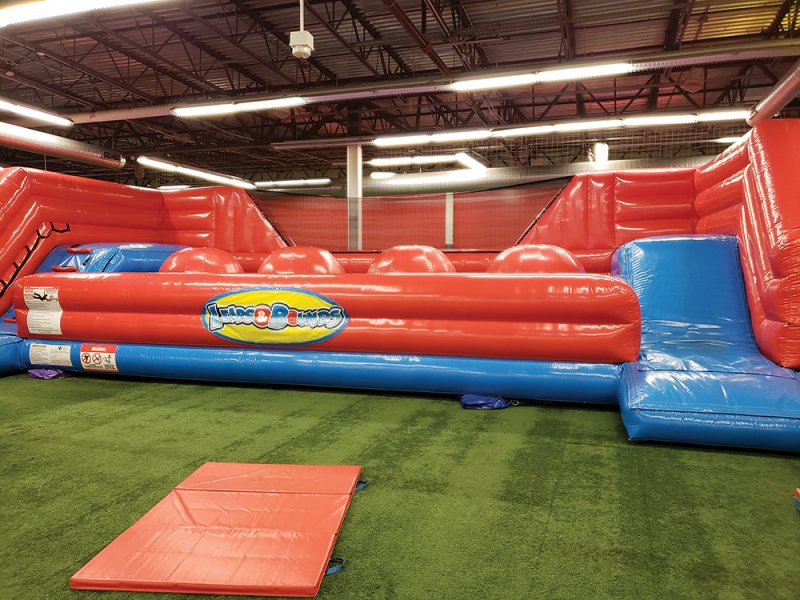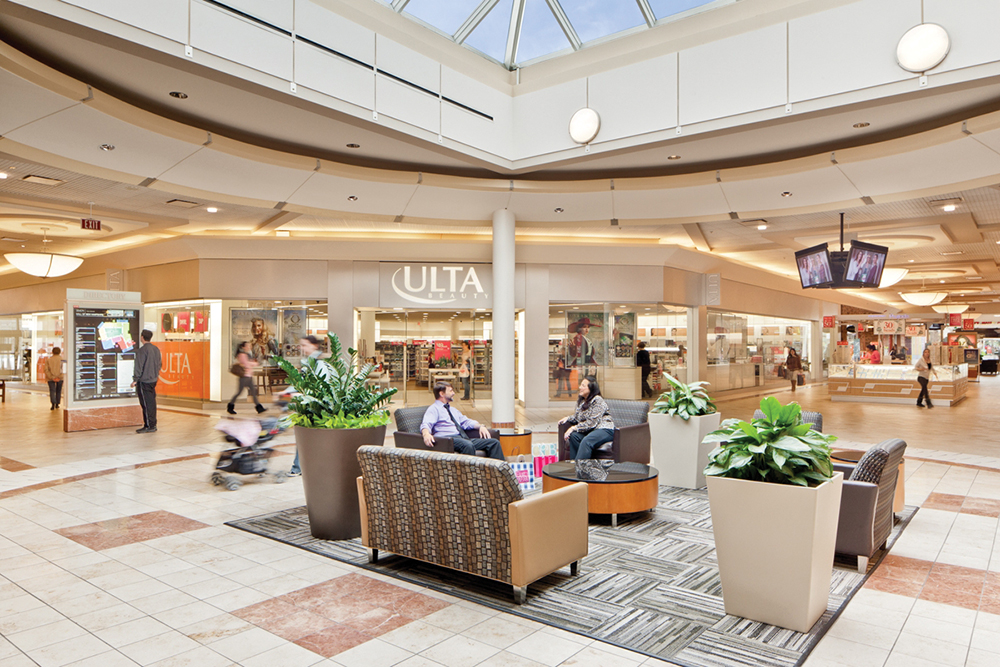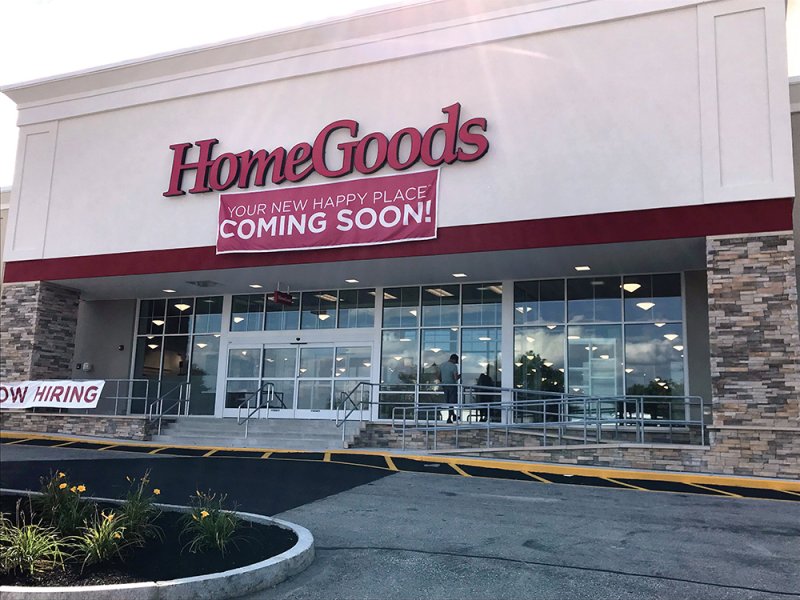
The Pheasant Lane Mall in Nashua. Courtesy of Simon Properties.
America’s love affair with the automobile and suburban lifestyle fueled the growth of malls in the 1970s.
Unfortunately, these shopping meccas, with ample parking, bright lights, climate control, and a swath of regional and national chains under one roof soon added to the economic woes of downtowns. But now the tide seems to have turned.
These days, as more people want to eat at locally-owned restaurants and shop more locally-produced goods, communities across NH are reclaiming downtowns, making them more walkable and livable with mixed-used buildings, apartments, and unique restaurants and shops. And malls are feeling the pinch.
As if the local movement weren’t enough of a problem for malls, the growth of online shopping has exacerbated their challenges. According to the latest U.S. Census Bureau figures, while online sales account for less than 10 percent of all retail sales, online sales have been growing steadily. Between the fourth quarter of 2017 and the first quarter of 2018, online sales increased nearly 4 percent. Traditional mall anchors such as Sears and JCPenney have been closing stores and laying off workers across the country—yet another sign that the mall is under siege.
However, while NH malls have had their share of store closures, other national retailers are moving in to take their place. Conversely, some national stores closing their locations elsewhere have left their NH properties intact. And vacancies left by big-box stores are now being filled by smaller, local tenants and outlets offering art and entertainment.
Steeplegate Mall in Concord has had major tenants move out or go under, including Circuit City, Bon-Ton, Charlotte Russe and Olympia Sports. Now playbills, trampolines and schoolbooks complement the offerings of clothing, perfume and shoes.
An art house performance venue, The Hatbox Theatre, opened in 2015 at Steeplegate and offers short plays, stand-up comedy, improv and music. It quickly beat conservative attendance estimates, and has already moved to a bigger space with its own entrance at the mall.

A performance at the Hatbox Theatre, located at the Steeplegate Mall in Concord. Courtesy photo.
“The success we’ve experienced is remarkable, and the way we’ve been embraced by the community is really satisfying and appreciated,” says Andrew Pinard, logistics manager at Hatbox. “Hatbox is a cooperative theatre space; productions are selected through an annual pitch night where groups vie to be a part of our season. Around 60 percent of ticket sales go directly to the production companies. Last March, almost 50 groups competed for slots on our upcoming third full season.”
Large open retail spaces also lend themselves to more athletic pursuits like rock climbing and jumping on trampolines. Altitude Trampoline recently opened its third NH location at Steeplegate in the former Circuit City, while another firm, ViParty Rentals and Entertainment Center, offers bounce houses and laser tag.

ViParty Rentals and Entertainment Center at the Steeplegate Mall. Courtesy photo.
Another tenant, just about to open its doors at Steeplegate, is the Capital City Public Charter School. According to the NH Dept. of Education, the school plans to open in the fall using a research-based teaching method of guided classroom learning for grades 6-8 in the first year, with a goal of serving grades 9-12 by the fifth year. The school is set up in the former Bon-Ton location.
Not All Doom and Gloom
With the recent closing of Toys R Us and the announcement that Brookstone would close all 101 mall stores as they filed for bankruptcy protection to reorganize, some retail experts are ready to call it another nail in the coffin of brick-and-mortar retail. But one of the largest mall operators in the country and owner of the state’s largest malls, remains optimistic.
Simon Malls-New England owns traditional malls—such as The Mall of NH in Manchester, Pheasant Lane Mall in Nashua and The Mall at Rockingham Park in Salem—as well Merrimack Premium Outlets, which was designed to mimic a downtown experience. Among the four properties, Simon Malls has more than 500 stores.

The Mall of New Hampshire in Manchester. Courtesy of Simon Properties.
Michael Merrow, regional VP of Simon Malls-New England, says malls provide an environment that goes far beyond shopping. He says, they are places for people to gather with friends and family. “We are always looking for new and exciting shopping, dining and entertainment options that we think our customers will enjoy,” he says.
Some recent examples Merrow cites include the construction of a 12-screen Cinemark movie theater, set to open in 2019 at The Mall at Rockingham Park, Blaze Pizza at Pheasant Lane Mall and the Manchester Craft Market, which sells locally-produced handcrafted goods at the Mall of NH.
Online Shopping at the Mall
While online retail continues to chip away at brick-and-mortar sales, some malls are embracing the trend rather than compete with it by becoming shipping hubs and distribution centers. Large retail spaces are ideal for collecting orders and staging merchandise.
Merrow notes many e-tailers recognize the value of malls and are opening brick and mortar stores or testing new-concept stores at malls. “Blue Nile [jeweler’s] webroom at The Mall at Rockingham Park is the perfect example of combining brick-and-mortar retail with online shopping, as it provides shoppers with the sensory experience of seeing the sparkle of a diamond or trying on a ring to get sized—an experience they can’t get online,” Merrow says. The Salem location is Blue Nile’s sixth web-room, expanding the company’s hybrid off- and online concept, combining the best features of brick and mortar with online selection, prices and a pressure-free environment.
Merrow says options to order online and pick up in-store continue to increase. “We have several stores providing this service … including Macy’s, JCPenney, and Kay Jewelers, to name a few,” Merrow says. “With that being said, brick-and-mortar retail continues to dominate retail sales – 90 percent of all retail sales are generated by retailers with physical establishments, according to the International Council of Shopping Centers.”
Bucking the Trend
While several major retailers started announcing planned store closings last year, including Sears (150 stores) and JCPenney (138 stores), NH has not been hit as hard. While some national chains have closed here, none of the state’s five JCPenney stores are slated to close although, just in August, Sears announced it will close its stores in Manchester and Salem by November, and the Newington store will close as well.
Russ Thibeault of Applied Economic Research in Laconia says although the state is affected by national trends, two aspects of NH’s market stand out: inflow and tourism. “We have inflow in the form of shopping along the borders because we have no sales tax. Salem, Nashua, Portsmouth and Lebanon attract lot of spending from outside the state.”
He says, as an economist who has been in the Lakes Region since 1974, he has never seen so much retail and nonresidential development in the pipeline. “The Lakes Region and mountains have a disproportionate amount of retail relative to population, so we are clearly bucking the trends.”
Thibeault says projects such as Market and Main, the mixed-use development in Bedford; Merrimack Premium Outlets and Tuscan Village, a redevelopment of the Rockingham Park racetrack in Salem, tell the real story. “It is no coincidence that they are in the southern part of the state. The inflow is what really sets us apart and buffers us against the national trends,” Thibeault says. “Despite the fact that the state population is hardly growing, we are pulling in wallets and credit cards from other places.”
Economist Brian Gottlob of PolEcon Research in Dover, agrees. He says the overall positive retail climate in the state could certainly play into the fact that large retailers have chosen to keep their NH stores open.
“New Hampshire is a retail mecca, with lots of visitors and no sales tax, so we are bucking the national trend,” Gottlob says. “Basically, [retail] employment is much better than in the rest of the region, with growth of about 2 percent; or roughly three to four times the national rate.”
Gottlob says the recent U.S. Supreme Court decision to require states to collect sales tax for online sales could actually help brick and-mortar stores if shoppers from nearby Maine and Massachusetts come to NH to avoid tax.
And, while they are shopping, they can see a show, and get some exercise or even a massage.
Strip Malls on the Move
Shelley Lord, vice president of Wilder Company, a Boston-based national retail real estate development, management and leasing firm that specializes in positioning retail properties, says it’s all about location, location, location.
Take when Sports Authority closed its spot at the Royal Ridge Center in Nashua in 2016, the strip mall was left with a big space. But, Lord says Nashua is a strong market. The center reconfigured and leased the space to Sierra Trading Post and HomeGoods. “There are national retailers that have not come into the market or don’t yet have the level of presence they want,” she says, noting Sierra, a new concept for TJ Maxx company, is a win for the city.

HomeGoods has taken over empty retail space at the Royal Ridge Center in Nashua. Courtesy of Brady Sullivan Properties.
Lord says people get away from their screens after a while, and are looking for experiences. “There is no cookie-cutter approach, especially in New Hampshire,” Lord says. “Developers are getting very creative and will look to ... what is good for the community.”
